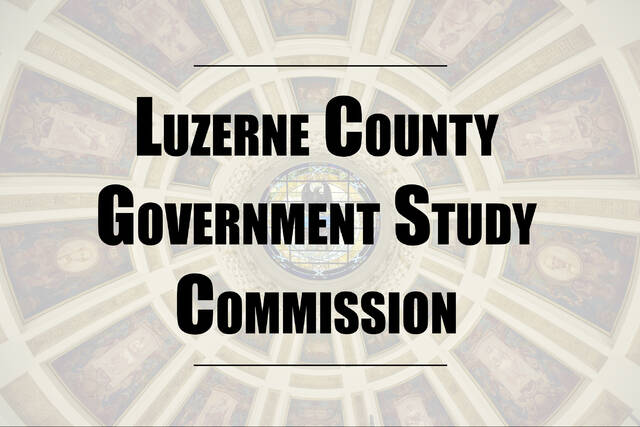Luzerne County’s Government Study Commission wrapped up its approval of three more home rule charter sections Monday, leaving the county election board as the main issue that must be addressed before it holds a public hearing in June.
The commission is drafting a revised charter that will come before voters for possible adoption in November.
Lengthy discussion is expected over the election board because there are differing views among citizens and county government officials on whether its composition should be altered or untouched.
The board provides general supervision over elections, certifies results and oversees post-election adjudication.
Prior to home rule’s implementation in January 2012, the county’s three elected commissioners served as the election board, with the court appointing substitutes during periods when sitting commissioners appeared on the ballot.
The current charter created an election board of five citizens. County council appoints four of the five — two Democrats and two Republicans. Those four council-appointed members then select someone of any affiliation, or no affiliation, to fill the fifth seat and also serve as chair.
The study commission decided Monday it will hold a required public hearing on its proposed charter June 17. It has scheduled five more meetings before the hearing, including two added Monday.
Commission Vice Chairman Vito Malacari emphasized the panel will have the option to alter its recommendations after the public hearing based on feedback.
Term limits
A commission majority reaffirmed its decision Monday to provide a clean slate to incumbent elected officials (council, the controller and district attorney) by not counting terms prior to the new charter’s effective date toward the three-term limit.
Citing the volume of citizen complaints about this “reset,” Commission member Mark Shaffer had proposed eliminating it Monday.
However, Commission Secretary Matt Mitchell first made a motion to keep the original plan intact, receiving majority votes in support from Malacari, Commission Chairman Ted Ritsick, and Stephen J. Urban.
Shaffer and Commission Treasurer Cindy Malkemes voted no. Commission member Tim McGinley was absent.
That vote applied to the council section of the charter, which later prompted Malkemes and Shaffer to also vote against the entire section based on the reset inclusion. The remaining four commission members adopted the council section.
During a subsequent vote on the section covering the DA and controller, Shaffer again voted no, predicting the reset clause will “sink the charter.” A majority approved the section.
Resign to run
All six commission members in attendance approved wording clarifying the DA and controller resign-to-run parameters.
The current charter says the elected officials cannot file a nomination or election petition or “become a candidate” for a different elective public office unless he/she first resigns as DA or controller.
The revised wording says resignation is necessary in this situation if the DA or controller files a nomination or election petition or accepts a party’s nomination for any other elective public office.
Commission members have said clarity is warranted because the “become a candidate” description created issues when prior DA Stefanie Salavantis ran for a county judge seat.
Public comment
More than a dozen citizens submitted email public comments Monday. The lion’s share opposed the term limit reset, and several also urged the commission to keep an 11-member county council instead of the majority-approved recommendation to switch to seven seats.
Dallas resident Diane Dreir said the county’s population and budget size warrant a council of 11 “instead of concentrating power and control in a smaller group.”
Prior election board member Denise Williams, a county council candidate, said the term limit reset and council size reduction would prompt her to vote no on the charter.
County Council members Jimmy Sabatino and Brittany Stephenson also strongly urged the commission to preserve the 11-member structure.
“An 11-member Council allows for broader representation and more meaningful engagement with constituents. It ensures that a wider range of voices are heard in deliberations, which leads to better policy outcomes and more public trust in the process,” Sabatino wrote. “Shrinking the council to seven would make it harder for smaller communities and underrepresented groups to have a seat at the table.”
Stephenson said 11 members ensures “that a wider array of voices and communities have a presence in local decision-making.”
“With new responsibilities being considered for council, reducing its size would place an even heavier burden on fewer people, making thoughtful governance harder, not easier,” Stephenson wrote. “More duties require more hands, more perspectives, and more collaboration. Keeping the 11-member format gives Luzerne County the best chance at responsive, balanced, and forward-thinking leadership.”

